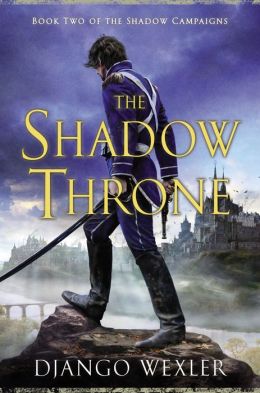Let’s get one thing out of the way first. This novel kicked far too many of my narrative kinks. Wexler has written us a second-world fantasy version of the French Revolution starring women (doing intrigue, running criminal gangs, in disguise and/or drag, arguing over politics in pubs, stabbing people, rescuing people, shooting people) and including a central, significant, queer relationship between two women.
FANTASY FRENCH REVOLUTION WITH LESBIANS. That’s basically, “Shut up and take my money,” territory, as far as I’m concerned.
The Thousand Names, the first novel in Wexler’s Shadow Campaigns series, combined magic with gunpowder, interesting characters—and colonial rebellions—for an experience reminiscent of Sharpe in its Sean Bean television days, albeit with more (and more interesting) female characters. The Shadow Throne is in chronological terms a direct sequel to The Thousand Names, but it’s a book with very different concerns, a very different setting, a new addition to our viewpoint protagonists, and even an entirely new cast of supporting characters: at times it feels much like the opening of a series in its own right.
The Shadow Throne takes place in Vordan City, capital of Vordan, and brings us face to face with Duke Orlanko, who was only a shadowy name in The Thousand Names. The king of Vordan is dying. His only heir is the princess Raesinia—and Orlanko knows an arcane secret that put her entirely in his power. But Raesinia (our newest viewpoint character) isn’t willing to be a mere puppet queen: at night she disguises herself and goes out among the intelligentsia, where with a band of unlikely allies she’s helping set in motion a groundswell of popular sentiment for reform.
Meanwhile, Colonel Janus bet Vhalnich, the hero of Khandar, has returned to the capital at speed—leaving most of his troops to follow more slowly. But Captain Marcus d’Ivoire and Lieutenant Winter Ihernglass have accompanied him. Upon Janus’s elevation to the post of Minister of Justice, Marcus finds himself in charge of Vordan City’s over-stressed police force, facing a city on the brink of riot and insurrection. Meanwhile Winter—who joined the army disguised as a man, and has maintained her imposture successfully for years, although Janus now knows her secret—finds herself dispatched to infiltrate one of the anti-tax-collector groups in the poorest areas around the docks: the Leatherbacks, which rumour has it are led by an inner cabal of women. With the Leatherbacks, Winter finds the lover she’d thought she’d lost forever: Mad Jane, alive and well and a leader among the labourers of the docks.
When Duke Orlanko overplays his hand and mobs—from the university, from the docks, from all over the city—gather in an outburst of anger that ends up overturning the old order, Winter, Marcus, and Raesinia find themselves riding a tiger. Orlanko and his supporters on one side, the city and its factions on the other, and in the shadows, the spectre of the Penitent Damned and their magic. On their side—or perhaps his own—is Janus bet Vhalnich, a genius with a great many secrets. And the only thing anyone can be sure of is that the struggle begun in Vordan City isn’t going to end any time soon.
Let’s get one thing straight: this is an immensely entertaining novel. While The Shadow Throne doesn’t give Marcus d’Ivoire an awful lot to do, making many of his scenes among the least compelling in the book, he still gets to take part in quite a bit of things going BOOM. His action only really seems lacking in comparison to Raesinia’s and Winter’s. Raesinia’s scenes are full of intrigue and demagoguery, plots and peril and cloak-and-dagger, while Winter’s are full of cloak-and-dagger and peril in their own way—and emotional tension, revelations, complicated relationships, and fighting in the streets and on the battlefield.
The secondary characters are all new,* here, and all well-drawn, from the small cabal of reformers that Raesinia gathers around herself, to Winter’s lover Jane and her group of survivors and dissidents, to characters like the determined university student Cyte and Vice-Captain Griforte, a man of torn loyalties. Things explode. There are running battles in the streets and daggers-drawn in stairwells, and more than one prison break/infiltration. The pacing zooms along with satisfying speed and tension. The gender balance in terms of interesting characters is particularly gratifying to me. A significant proportion of the characters are women, badass women with their own needs and their own agendas, and they get their own moments of awesome. It’s also gratifying to finally read an epic fantasy novel by a male author that hasn’t set out to demonstrate how deeply it can delve into the grim, brutal, and horrific: there’s optimism in The Shadow Throne, and the sense that things might just work out in the end.
*If you want to find out what’s happening with Feor and Bobby from The Thousand Names—and the Thousand Names themselves—it looks like we’ll have to wait for the next book.
That said, much as I loved it, The Shadow Throne isn’t perfect. It’s clearly laying the groundwork for a much longer series, and several interesting strands of plot or character are introduced without being resolved. Characters tend to be on the young side: I’m not sure we’ve yet been introduced to a woman over thirty in Vordan City, although many old men are evil schemers. Wexler is also noticeably prone to relying on remarkable coincidence to set all the varied parts of his story in play and get them moving.
But these are small complaints for a book that gave me a remarkable amount of entertainment—and one that made me happy too. I can recommend it sincerely: The Shadow Throne is fun.
The Shadow Throne is available now from Roc.
Liz Bourke is a cranky person who reads books. Her blog. Her Twitter.










